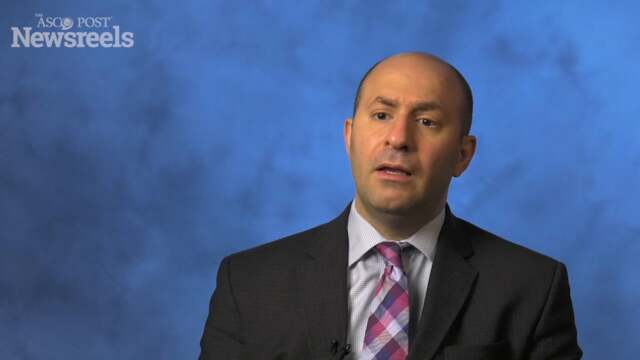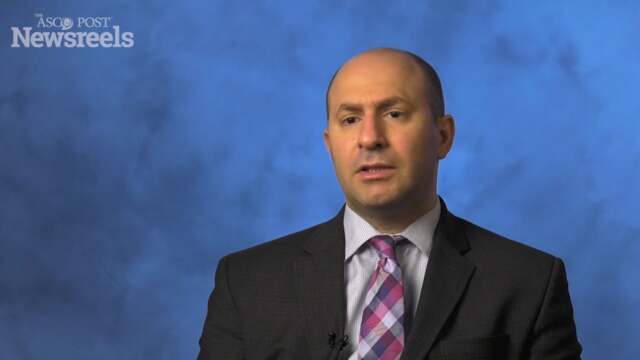Robert A. Figlin, MD, on RCC: Results From the ADAPT Trial
Robert A. Figlin, MD, of Cedars-Sinai Medical Center, discusses an interim analysis of phase III findings on rocapuldencel-T, an individualized immunotherapy, for newly diagnosed patients with metastatic renal cell carcinoma (Abstract 1137O).
Bernard J. Escudier, MD, on RCC: Results From the CheckMate 214 Trial
Bernard J. Escudier, MD, of Gustave Roussy, discusses efficacy and safety of nivolumab plus ipilimumab vs sunitinib for treatment-naïve advanced or metastatic renal cell carcinoma, including IMDC risk and PD-L1 expression subgroups (Abstract LBA5).
Maha Hussain, MD, FACP, FASCO, Credits Collaboration for Her Contributions to Genitourinary Cancer
Internationally recognized genitourinary oncologist Maha Hussain, MD, FACP, FASCO, was born and reared in Baghdad, Iraq. “I came from a family that stressed the value of higher education and especially medicine. I have three uncles who are physicians, and my father encouraged my three siblings and...
Journal of Clinical Oncology Literature Update
Staying up-to-date in the fast-paced world of oncology literature is a daunting task at best. To assist with that task, The ASCO Post has assembled an assortment of studies recently published in the Journal of Clinical Oncology. The topics range from therapy for stage IV non–small cell lung cancer...
Tivozanib Approved in the European Union for the Treatment of Advanced Renal Cell Carcinoma
On August 28, AVEO Oncology announced that the European Commission (EC) has approved tivozanib (Fotivda) for the treatment of adult patients with advanced renal cell carcinoma in the European Union plus Norway and Iceland. Tivozanib is indicated for the first-line treatment of adult patients with...
CheckMate-214: Nivolumab and Ipilimumab in Intermediate- and Poor-Risk Previously Untreated Advanced or Metastatic RCC
On August 15, Bristol-Myers Squibb Company announced topline results from the CheckMate-214 trial investigating nivolumab (Opdivo) in combination with ipilimumab (Yervoy) vs sunitinib (Sutent) in intermediate- and poor-risk patients with previously untreated advanced or metastatic renal cell...
Nivolumab Plus Ipilimumab in Metastatic Renal Cell Carcinoma
The phase I CheckMate 016 trial has shown activity of the combination of nivolumab (Opdivo) plus ipilimumab (Yervoy) in metastatic renal cell carcinoma. These findings were reported in the Journal of Clinical Oncology by Hammers et al. Study Details In the dose-escalation study, patients were...
Expert Point of View: Hans Hammers, MD, PhD
THE COMBINATION of checkpoint inhibitors and vascular endothelial growth factor (VEGF) inhibitors is attractive in renal cell carcinoma, said formal discussant of this trial, Hans Hammers, MD, PhD, of the University of Texas Southwestern Medical Center in Dallas. “Twenty-one percent of patients...
Atezolizumab/Bevacizumab Moves Forward in Metastatic Renal Cell Carcinoma
THE COMBINATION of atezolizumab (Tecentriq) plus bevacizumab (Avastin) showed promising results as first-line treatment of patients with metastatic renal cell carcinoma, according to a phase II trial called IMmotion 150. Based on these results, the phase III IMmotion 151 trial is comparing...
MET Inhibitor Savolitinib in Advanced Papillary Renal Cell Cancer
In a biomarker-based phase II trial reported in the Journal of Clinical Oncology, Choueiri et al found that the MET tyrosine kinase inhibitor savolitinib was active in MET-driven advanced papillary renal cell cancer. Study Details In the trial, 109 patients with locally advanced or metastatic...
Daniel Heng, MD, MPH, and Sumanta K. Pal, MD, on Renal Cell Carcinoma: Expert Perspectives
Daniel Heng, MD, MPH, of the Tom Baker Cancer Centre and the University of Calgary, and Sumanta K. Pal, MD, of the City of Hope, discuss key findings presented at ASCO: adjuvant pazopanib vs placebo after nephrectomy in patients with locally advanced disease (the PROTECT Trial), and adjuvant sunitinib used to treat high-risk disease.
Bernard J. Escudier, MD, and Sumanta K. Pal, MD, on RCC: Trial Results on Sunitinib
Bernard J. Escudier, MD, of Gustave Roussy Cancer Campus, and Sumanta K. Pal, MD, of City of Hope, discuss phase III study findings on adjuvant sunitinib used to treat high-risk renal cell carcinoma, which validate the 16-gene Recurrence Score in patients with stage III disease. (Abstract 4508)
Toni K. Choueiri, MD, and Sumanta K. Pal, MD, on Top Kidney Cancer Abstracts: Expert Perspectives
Sumanta K. Pal, MD, of City of Hope, and Toni K. Choueiri, MD, of the Dana-Farber Cancer Institute, exchange views on the key papers in renal cell carcinoma presented at ASCO’s 2017 nonprostate GU oral abstract session. (Abstracts 4504, 4505, 4506, 4507, 4508)
Primo Lara, MD, on RCC: Expert Perspective on Three Key Papers
Primo Lara, MD, of the University of California, Davis Comprehensive Cancer Center, discusses three top abstracts on treating advanced renal cell carcinoma with epacadostat, pembrolizumab, atezolizumab, bevacizumab, sunitinib, or pazopanib. (Abstracts 4505, 4507, 4515)
Managing Small Renal Masses: A Point-by-Point Consideration of ASCO’s Clinical Practice Guideline
As reviewed in this issue of The ASCO Post, a recent issue of the Journal of Clinical Oncology featured an ASCO Clinical Practice Guideline on the management of small renal masses reported by Finelli and colleagues.1 This comprehensive guideline is written by a group of well-regarded and...
ASCO Clinical Practice Guideline: Management of Small Renal Masses
As reported in the Journal of Clinical Oncology by Antonio Finelli, MD, of Princess Margaret Cancer Center, Toronto, and colleagues, ASCO has released a clinical practice guideline on management of small renal masses.1 The guideline was derived from an expert panel literature search for and...
Prognostic Model May Prove Useful After Nephrectomy
A prognostic model proved able to accurately predict long-term outcomes for patients with stage I to III renal cell carcinoma, the developers of the instrument reported at the 2017 National Comprehensive Cancer Network Annual Conference.1 The model was derived from molecular tissue analysis and...
NCCN Clinical Practice Guidelines in Oncology (NCCN Guidelines®): 2017 Guidelines
NCCN Clinical Practice Guidelines in Oncology (NCCN Guidelines®): 2017 Guidelines In 1996, the National Comprehensive Cancer Network® (NCCN®) published its first set of Clinical Practice Guidelines in Oncology®, covering 8 tumor types. Guidelines are now published for more than 60 tumor types and...
Complete Surgical Metastasectomy for Patients With Metastatic Renal Cell Carcinoma May Extend Life Expectancy
Mayo Clinic researchers have discovered that surgery could more than double life expectancy for many patients with late-stage kidney cancer, giving them anywhere from 2 to almost 10 years more than they would have without the surgery. A paper published by Zaid et al in The Journal of Urology found...
Noninvasive Imaging Test May Accurately Rule Out Kidney Cancers
The latest in a series of studies led by researchers at Johns Hopkins Medicine shows that addition of a widely available, noninvasive imaging test called 99mTc-sestamibi SPECT/CT (single-photon emission computed tomography plus computed tomography) to conventional CT or magnetic resonance imaging...
Expert Point of View: Eric Jonasch, MD
Eric Jonasch, MD, Professor in the Department of Genitourinary Cancer at MD Anderson Cancer Center in Houston, commented on this phase II study. “This is an important study, since we have, for the first time, randomized, prospective data comparing the combination of a checkpoint antibody with an...
Combination of Atezolizumab and Bevacizumab in PD-L1–Positive Patients With Metastatic Kidney Cancer
The combination of atezolizumab (Tecentriq) and bevacizumab (Avastin) appears to be promising in the first-line treatment of patients with metastatic renal cell carcinoma, according to results of a phase II trial presented at the 2017 Genitourinary Cancers Symposium.1 Despite the failure of the...
Next-Generation Genitourinary Oncology: Keeping One’s Powder Dry
There is a new yin-yang of management in genitourinary oncology, with the balance of opposing power focused among cancer cells, kinase inhibition, and lymphocyte function, representing a shift in the fashions of treatment somewhat away from chemotherapy. This linear progress has been complicated...
Spanish Trial Shows Benefit of Vinflunine Maintenance in Advanced Urothelial Carcinoma
In a Spanish phase II trial reported in The Lancet Oncology, García-Donas et al found that maintenance therapy with vinflunine improved progression-free survival vs best supportive care alone in patients with advanced urothelial carcinoma with disease control on first-line chemotherapy....
Cryoablation for Small Renal Tumors: One Radiologist’s Experience
In a separate talk at the 2017 Genitourinary Cancers Symposium, Thomas Atwell, MD, a radiologist at the Mayo Clinic, Rochester, Minnesota, who performs ablation, discussed his experience with cryoablation for small renal tumors. “Early in our practice, we used both radiofrequency ablation and...
Expert Point of View: Alessandro Volpe, MD
Formal discussant of this abstract, Alessandro Volpe, MD, of the University of Eastern Piedmont Hospital, Maggiore Della Carita Hospital, Novara, Italy, commented that nephron-sparing surgery is recommended for clinical stage T1 tumors; however, when compared with ablation, the advantages of...
Evolving Role for Cryoablation in Treating Small Renal Masses
Selected “healthy” patients with clinical T1 renal cell carcinoma may be safely treated with percutaneous cryoablation, according to a single-center study of experience at the Mayo Clinic.1 “In healthier patients, our experience shows that cryoablation achieved good short-term oncologic control...
AACR 2017: Combination Immunotherapies Show Clinical Activity in Metastatic RCC in Pilot Study
Immunologic changes observed in an early study of patients with metastatic renal cell carcinoma (RCC) raised the possibility for a larger clinical study of combination immunotherapy, according to findings reported by researchers at The University of Texas MD Anderson Cancer Center. The results of...
Analysis of High-Risk Subgroup in ASSURE Trial of Sunitinib or Sorafenib in Renal Cell Carcinoma
In an analysis of the phase III ASSURE trial reported in JAMA Oncology, Haas et al found no disease-free or overall survival benefit of adjuvant sunitinib (Sutent) or sorafenib (Nexavar) vs placebo in a high-risk subset of patients with clear cell renal cell carcinoma histology and pT3, pT4, or...
Intermittent Sunitinib in Metastatic Renal Cell Carcinoma
In a phase II study reported in the Journal of Clinical Oncology, Moshe C. Ornstein, MD, of Cleveland Clinic Taussig Cancer Institute, and colleagues found that an intermittent schedule of sunitinib (Sutent) may be feasible in patients with previously untreated metastatic renal cell carcinoma. In...
Active Surveillance Appears to Be Safe for Small Renal Masses
The prospective Delayed Intervention and Surveillance for Small Renal Masses (DISSRM) registry shows that over the intermediate term, active surveillance appears to be as safe as primary intervention for carefully selected, older, sicker patients with small renal masses.1 As the data mature,...
Sumanta K. Pal, MD, on Advanced Renal Cancer: Treatment Challenges
Sumanta K. Pal, MD, of the City of Hope, summarizes a session he co-chaired on the opportunities and challenges in systemic therapy for advanced renal cancer, including imaging as a biomarker of response and optimal selection of front-line treatments. (General Session 9)
Rana R. McKay, MD, on RCC: Continuing Benefit After Halting Treatment
Rana R. McKay, MD, of the University of California, San Diego, discusses study findings on PD-1/PD-L1 responders with metastatic renal cell carcinoma who discontinue therapy for immune-related adverse events. (Abstract 467)
W. Marston Linehan, MD, on Renal Cell Carcinoma: Genetic Predisposition
W. Marston Linehan, MD, of the National Cancer Institute, discusses the genetic basis of the different types of kidney cancer, which provides the key to clinical management.
Sumanta K. Pal, MD, on RCC and Tumor Profiling
Sumanta K. Pal, MD, of the City of Hope, discusses the evolution of circulating tumor DNA profile from first-line to second-line therapy in metastatic renal cell carcinoma. (Abstract 434)
Toni K. Choueiri, MD, on Untreated RCC: Phase II Trial Results
Toni K. Choueiri, MD, of the Dana-Farber Cancer Institute, discusses study findings on atezolizumab with or without bevacizumab vs sunitinib in patients with untreated metastatic renal cell carcinoma. (Abstract 431)
Toni K. Choueiri, MD, on Papillary RCC: Phase II Trial Results
Toni K. Choueiri, MD, of the Dana-Farber Cancer Institute, discusses a single-arm biomarker-based study of savolitinib in patients with advanced papillary renal cell cancer. (Abstract 436)
2017 GU Cancers Symposium: Atezolizumab Plus Bevacizumab Shows Potential in Metastatic Renal Cell Carcinoma
Results from the phase II IMmotion150 study that compared atezolizumab (Tecentriq) plus bevacizumab (Avastin) and atezolizumab monotherapy to sunitinib (Sutent) alone in patients with previously untreated, locally advanced or metastatic renal cell carcinoma were presented at the 2017 Genitourinary...
2017 GU Cancers Symposium: In Advanced Kidney Cancer, Antibiotic Use Lowers Efficacy of Immunotherapy
A new retrospective analysis suggests that immunotherapy may be less effective in patients who receive antibiotics less than a month before starting treatment. In the study, cancer worsened more quickly in such patients than in those who did not receive antibiotics (with median progression-free...
2017 GU Cancers Symposium: Some Patients With Renal Cell Carcinoma Experience Long-Term Tumor Control Even After Stopping Immunotherapy Early
Early findings from a new study appear to challenge the current standard practice for immune checkpoint inhibitor therapy—continuing treatment until cancer worsens. Among patients with advanced kidney cancer who stopped programmed cell death protein 1/programmed cell death ligand 1...
Intermittent Sunitinib Appears Feasible in Previously Untreated Metastatic Renal Cell Carcinoma
In a phase II study reported in the Journal of Clinical Oncology, Ornstein et al found that an intermittent schedule of sunitinib (Sutent) may be feasible in patients with previously untreated metastatic renal cell carcinoma. Study Details In the study, 37 patients with clear cell metastatic...
ASCO Clinical Practice Guideline on Management of Small Renal Masses
As reported in the Journal of Clinical Oncology by Antonio Finelli, MD, of Princess Margaret Cancer Centre, Toronto, and colleagues, ASCO has released a clinical practice guideline on management of small renal masses. The guideline was derived from an expert panel literature search for and...
A Decade of Impact: Conquer Cancer Foundation/Kidney Cancer Association Young Investigator Awards
The Kidney Cancer Association has supported 12 kidney cancer research projects through the Conquer Cancer Foundation of ASCO Young Investigator Award (YIA) program over the past decade. Early seed funding from the Kidney Cancer Association is advancing research, improving the lives of ...
Clinical Trials Actively Recruiting Patients With Renal Cell Carcinoma
The information contained in this Clinical Trials Resource Guide includes actively recruiting clinical studies focused on immunotherapy as treatment for renal cell carcinoma. These studies are researching combination chemotherapies; immunotherapies; radiosurgery techniques; stereotactic body...
Study Finds Cabozantinib of Clinical Benefit vs Sunitinib in Advanced Renal Cell Carcinoma
A randomized phase II clinical trial evaluating cabozantinib (Cabometyx) compared with standard-of-care sunitinib (Sutent) as first-line therapy for patients with advanced renal cell carcinoma has found that cabozantinib reduced the rate of disease progression or death by 34% compared with...
Adjuvant Sunitinib for Renal Cell Carcinoma: Not Ready for Prime Time
In renal cell carcinoma and other cancer types, a consistent paradigm in drug development exists: Observe efficacy of a drug in the metastatic setting and move quickly to explore the agent in the adjuvant setting. In the cytokine era, there were multiple efforts to characterize whether adjuvant...
Adjuvant Sunitinib Improves Disease-Free Survival in High-Risk Renal Cell Carcinoma After Nephrectomy
In the phase III S-TRAC trial reported at the recent European Society for Medical Oncology meeting and in The New England Journal of Medicine by Alain Ravaud, MD, PhD, of Bordeaux University Hospital, and colleagues, adjuvant sunitinib (Sutent) significantly prolonged disease-free survival vs...
Vaccine Therapy in Metastatic Renal Cell Carcinoma: Past, Present, and Future
As reviewed in this issue of The ASCO Post, Brian Rini, MD, and colleagues recently reported results from the phase III IMPRINT trial,1 which randomized HLA-A*02–positive patients with treatment-naive metastatic clear cell variant renal cell carcinoma, in favorable- and intermediate- risk...
Phase III Trial Shows No Survival Benefit of Adding First-Line IMA901 Vaccine to Sunitinib in Advanced Renal Cell Carcinoma
In the phase III IMPRINT trial reported in The Lancet Oncology, Brian I. Rini, MD, of the Cleveland Clinic Taussig Cancer Institute, and colleagues found no overall survival benefit of adding the multipeptide cancer vaccine IMA901 to sunitinib (Sutent) in the first-line treatment of locally...
SITC Publishes First Kidney Cancer Treatment Guideline to Focus on Immunotherapy
The first evidence-based consensus statement on cancer immunotherapy for the treatment of patients with the most common type of kidney cancer, renal cell carcinoma, has been published by the Society for Immunotherapy of Cancer (SITC) in the Journal for ImmunoTherapy of Cancer by Rini et al. The...












